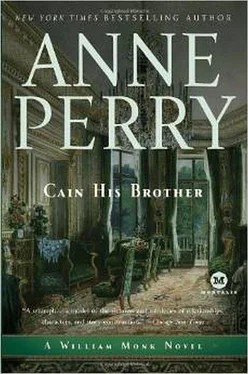Anne Perry - Cain His Brother
Здесь есть возможность читать онлайн «Anne Perry - Cain His Brother» весь текст электронной книги совершенно бесплатно (целиком полную версию без сокращений). В некоторых случаях можно слушать аудио, скачать через торрент в формате fb2 и присутствует краткое содержание. Год выпуска: 0101, Жанр: Исторический детектив, на английском языке. Описание произведения, (предисловие) а так же отзывы посетителей доступны на портале библиотеки ЛибКат.
- Название:Cain His Brother
- Автор:
- Жанр:
- Год:0101
- ISBN:нет данных
- Рейтинг книги:4 / 5. Голосов: 1
-
Избранное:Добавить в избранное
- Отзывы:
-
Ваша оценка:
- 80
- 1
- 2
- 3
- 4
- 5
Cain His Brother: краткое содержание, описание и аннотация
Предлагаем к чтению аннотацию, описание, краткое содержание или предисловие (зависит от того, что написал сам автор книги «Cain His Brother»). Если вы не нашли необходимую информацию о книге — напишите в комментариях, мы постараемся отыскать её.
Cain His Brother — читать онлайн бесплатно полную книгу (весь текст) целиком
Ниже представлен текст книги, разбитый по страницам. Система сохранения места последней прочитанной страницы, позволяет с удобством читать онлайн бесплатно книгу «Cain His Brother», без необходимости каждый раз заново искать на чём Вы остановились. Поставьте закладку, и сможете в любой момент перейти на страницу, на которой закончили чтение.
Интервал:
Закладка:
It was barely a question. He had already assumed the answer.
“No…” The word was no more than a whisper.
“What?”
“No,” she repeated with despair, her eyes wide, blue gray and burningly direct. “Angus's brother Caleb is every thing he is not violent, brutal, dangerous, an outcast even among the underworld along the river beyond Limehouse, where he lives.” She gave a shuddering sigh. “I used to beg Angus not to keep seeing him, but in spite of everything Caleb did, he felt that he could not abandon him.” A shadow crossed her face. “There is something very special about being a twin, I suppose. I confess, it is not something I understand.” She shook her head a little, as if denying her own anguish. “Please, Mr. Monk, will you find out what happened to my husband for me? I…” She bit her lip, but her eyes did not waver. “I shall need to know your terms in advance. My resources are limited.”
“I will make inquiries, Mrs. Stonefield.” He spoke before he considered the implications for his own financial status. “Then when I report their results to you, we can make arrangements accordingly. I shall need certain information from you in order to begin.”
“Of course. I understand. I am sorry I do not have a picture of him to show you. He did not care to sit for a portrait.” She smiled with a sudden tenderness that was desperate with pain. “I think he felt it a trifle vain.” She took a deep breath and steadied herself. “He was tall, at least as tall as you are.” She was concentrating fiercely, as if bitterly aware she might not see him again, and all too soon would she find his appearance fading from its present clarity in her mind. “His hair was dark, indeed his coloring was not unlike yours, except that his eyes were not gray, but a most beautiful shade of green. He had very good features, a strong nose and a generous mouth. He was quite gentle in manner, not at all arrogant, but yet no one ever supposed him to be a person with whom one might take liberties.”
He was aware that already she spoke of him in the past. The room was full of her fear and the sense of grief to come. He considered asking her of Stonefield's business affairs, or the likelihood of his having another woman, but he doubted he would receive an answer from her which would be accurate enough to be of any value. It would only distress her unnecessarily. It would be better to seek some tangible evidence and form his own judgment.
He rose to his feet and she rose also, her face tight with apprehension, her chin high, ready to argue with him, plead if necessary.
“I shall begin inquiries, Mrs. Stonefield,” he promised.
Immediately she relaxed, coming as close to a smile as she was capable in her present mind. “Thank you…”
“If you will give me your address?” he asked.
She fished in her reticule and brought out two cards, offering them to him in her gloved hand. “I'm afraid I did not think of a letter of authority…”
She looked embarrassed. “Have you any paper?”
He went to the desk, opened it and took out a plain white sheet of notepaper, a pen, ink and blotting paper. He pulled out the chair where she might sit. While she was writing he glanced at the cards she had given him and saw that the home was on the borders of Mayfair, a very acceptable area for the gentry. The business was south of the river on the Waterloo Road on the edge of Lambeth.
She finished the letter, signed it, blotted it carefully and handed it to him, looking up at him anxiously while he read it.
“It is excellent, thank you.” He folded it, reached for an envelope and placed it inside, to keep it from becoming soiled, then put it in his pocket.
She rose to her feet again. “When shall you begin?”
“Immediately,” he replied. “There is no time to be lost. Mr. Stonefield may be in some danger or difficulty but still able to be rescued from it.” “Do you think so?” For a moment hope flared in her eyes, then reality returned, and with it renewed pain. She turned away to hide her emotion from him, to save them both embarrassment. “Thank you, Mr. Monk. I know you mean to offer me comfort.” She went to the door, and he only just reached it in time to open it for her. “I shall await news.” She went out and down the step into the street, then walked away, northwards, without looking back.
Monk closed the door and returned to his room. He put more coal on the fire, then sat down in his armchair and began to consider the problem and what he knew of it.
It was common enough for a man to desert his wife and children. The possibilities were endless, without even considering his having come to harm-let alone anything so bizarre and tragic as having been murdered by his own brother. Mrs. Stonefield had clearly wanted to believe that. Monk observed to himself that it was the solution least harmful to her. Without entirely dismissing it out of hand, he was inclined to relegate it to the bottom of the list of possibilities. The most obvious answers were that he had simply found his responsibilities overweighing him and run off, or that he had fallen in love with another woman and decided to live with her. The next most probable was some financial disaster, either already occurred or pending in the near future. He might have gambled and finally lost more than he could meet, or borrowed from a usurer and been unable to repay the interest, which would grow day by day. Monk had seen more than a few victims of such practice and he hated moneylenders with a cold and unremitting passion.
Stonefield might have made some enemy he had good reason to fear, or be the victim of blackmail for an indiscretion or even a crime. He might be fleeing the law for some misappropriation not yet uncovered, or any other offense, an accident or a sudden violence not so far traced to him. He might have suffered an accident and be lying in hospital or in a workhouse somewhere, too ill to have sent his family word.
It was even conceivable that, like Monk himself, he had been struck on the head with a blow which had obliterated his memory. He broke out in a prickle of sweat which a moment after was cold on his skin as he remembered waking up two years before in what he had taken to be a workhouse without the slightest idea who or where he was. His past had been an utter blank to him. Even his face in the glass had been unrecognizable.
Slowly he had pieced together fragments here and there, scenes of his youth, his journey south from Northumberland to London, probably when he was nineteen or twentyroughly about the time of the accession of Queen Victoria, although he could not remember it. The coronation he knew only from pictures and other people's descriptions.
Even this much was deduced, because he supposed himself to be now in his early forties, and it was January 1859.
Of course, it was absurd to suppose Angus Stonefield was in a similar situation. Such things must happen exceedingly rarely. But then murder was fortunately not so common either. It was far more probably some sad but ordinary domestic circumstance or a financial disaster.
He always disliked having to tell a woman such a thing. In this case it would be harder than usual because already he had formed a certain respect for her. There was a femininity to her which was charming, and yet a defiant courage, and in all she had told him, in spite of her grief and thinly concealed desperation, there was no self-pity. She had asked for his professional services, not begged his compassion. If Angus Stonefield had left her for another woman, he was a man whose taste Monk did not under- stand, or share.
Still turning the matter over in his mind, he rose, stoked the fire and set up the guard, then put on his coat and hat and took a hansom cab south from his rooms in Fitzroy Street, down Tottenham Court Road, Chasing Cross Road, then the Strand, right at Wellington Street and across Waterloo Bridge to the business address on the card Mrs. Stonefield had given him. He alighted, paid the driver and dismissed him. He turned to look at the building. The outside appeared prosperous, in a discreet fashion, either from old money so well known it had no need to advertise or money newly earned but with the tact to remain unostentatious.
Читать дальшеИнтервал:
Закладка:
Похожие книги на «Cain His Brother»
Представляем Вашему вниманию похожие книги на «Cain His Brother» списком для выбора. Мы отобрали схожую по названию и смыслу литературу в надежде предоставить читателям больше вариантов отыскать новые, интересные, ещё непрочитанные произведения.
Обсуждение, отзывы о книге «Cain His Brother» и просто собственные мнения читателей. Оставьте ваши комментарии, напишите, что Вы думаете о произведении, его смысле или главных героях. Укажите что конкретно понравилось, а что нет, и почему Вы так считаете.












